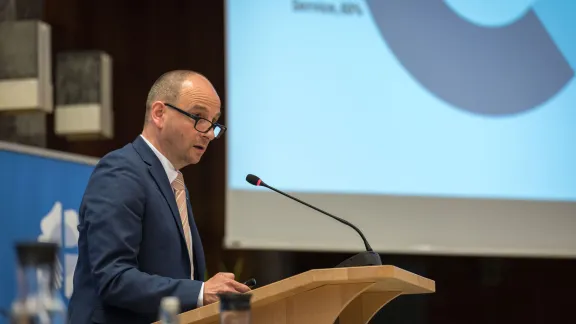
Oberkirchenrat Olaf Johannes Mirgeler, chairperson of the LWF Finance Committee. Photo: LWF/Albin Hillert
Finance committee chairperson reports to the Council
(LWI) - The Lutheran World Federation (LWF) reported positive financial results for 2018, maintaining a balanced budget despite exchange rate volatility and other financial market uncertainties.
Total income was EUR 150 million, contributed by member churches and related organizations, the United Nations and government grants, the Jerusalem-based Augusta Victoria Hospital, international partners and other contributors, the LWF Finance Committee chairperson Oberkirchenrat Olaf Johannes Mirgeler told the Council meeting in Geneva today.
“Our policy is to avoid financial deficits from operations, which is crucial for the LWF’s success and to maintain the long-term financial stability. I am delighted to see another year with overall positive results,” he added.
Our policy is to avoid financial deficits from operations, which is crucial for the LWF’s success and to maintain the long-term financial stability. I am delighted to see another year with overall positive results.
Income was down by EUR 16 million or 10 percent from 2017. Compared to the 2018 budget of EUR 163 million there was a shortfall of EUR 13 million or eight percent. The LWF managed and balanced its “income and expenditure through careful budget planning, monitoring of expenditure” and by effectively managing “procurement and other financial transactions,” the Finance Committee chairperson said in his report.
EUR 145.77 million expenditure
The total LWF expenditure for 2018 reached EUR 145.77 million. The decrease compared to the previous year was due to lower revenues for the Department for World Service, receipt of less funding than budgeted for the Department for Mission and Development programs and less income from member church fees.
Membership fees continue to “play a crucial role” in supporting the work of the Communion Office, with EUR 2.72 million received in 2018, Mirgeler said. The fair share formula on which contributions are calculated is being reviewed “to understand its relevance across the breadth of the Lutheran communion” as some member churches currently pay more while others pay less than expected.
“Growth in membership fee income would help to provide support for areas that have been identified as high priority such as theological work and ecumenical relations, for which funding has not been stable in recent years,” he said.
Securing financial stability
The LWF Endowment Fund, a separate legal entity, stood at CHF 14.99 million in total contributions by 31 December 2018, including CHF 2.59 million in the Evangelical Lutheran Church in America Endowment Fund Pooled Trust. The finance chairperson noted losses recorded due to high volatility in the markets at the end of the year were recovered in the first quarter of 2019 to reach a positive 9.61 percent performance, and the continuing uncertainty and volatility is being monitored closely and regularly.
Mirgeler reported that since 2014, LWF’s reserves had increased from EUR 23.65 million to EUR 52.12 million at the end of 2018. “Such positive financial situation makes us trustworthy to engage new partnerships for the sake of the mission of the LWF,” he added.
He concluded his report by thanking the LWF for maintaining its strong commitment to financial stability, delivering “a balanced budget and adequate cash reserves to ensure ongoing operations.”
The 2019 LWF Council meeting takes place in Geneva from 13 to 18 June. The theme of the Council is “Because we know God’s voice” (John 10:4). The LWF Council meets yearly and is the highest authority of the LWF between assemblies. It consists of the President, the Chairperson of the Finance Committee, and 48 members from LWF member churches in seven regions.


